Tracks made by dinosaurs up to 60 feet tall have been found in a river bed after they were exposed by severe drought conditions.
The clear prints found in the earth at Dinosaur Valley State Park, in Texas, are believed to date from around 113 million years ago.
A heatwave and a lack of rainfall, which has also led to massive wildfires, has led to the uncovering of the tracks.
Some of the prints at the park in Glen Rose were from the Sauroposeidon dinosaur which was about 60 feet tall and weighed around 44 tonnes when fully grown.
Although more of the tracks are from the Acrocanthosaurus, said a park spokesperson.

"Most tracks that have recently been uncovered and discovered at different parts of the river in the park belong to Acrocanthosaurus," park spokesperson Stephanie Salinas Garcia told CNN.
"This was a dinosaur that would stand, as an adult, about 15 feet tall and (weigh) close to seven tons,"
The US Drought Monitor said that more than 60% of Texas is going through droughts in the most extreme categories with the dry ground making it very susceptible for fires to break out.
Normally the dinosaur tracks would have been under water and filled with sediment, continued Ms Salinas Garcia.
"Being able to find these discoveries and experience new dinosaur tracks is always an exciting time at the park!"

And with rain being predicted soon it is likely that the dinosaur track will be quickly covered up again.
"While these newer dinosaur tracks were visible for a brief amount of time, it brought about the wonder and excitement about finding new dinosaur tracks at the park," Ms Salinas Garcia said. "Dinosaur Valley State Park will continue to protect these 113-million year-old tracks not only for present, but future generations."
The world is facing a drought emergency as rivers run dry, reservoirs shrink, and swathes of once-fertile land become barren deserts.
Parts of the UK are suffering drought conditions that endanger wildlife, destroy crops and shrink water supplies.
Almost every continent is now experiencing drought, Europe facing its worst in 500 years. The United Nations says drought risks becoming "the next pandemic" if nations fail to take action on water and land management and tackling climate change.
The UN says the frequency and duration of droughts has increased by almost a third since 2000, at least 1.5 billion people directly affected this century.







